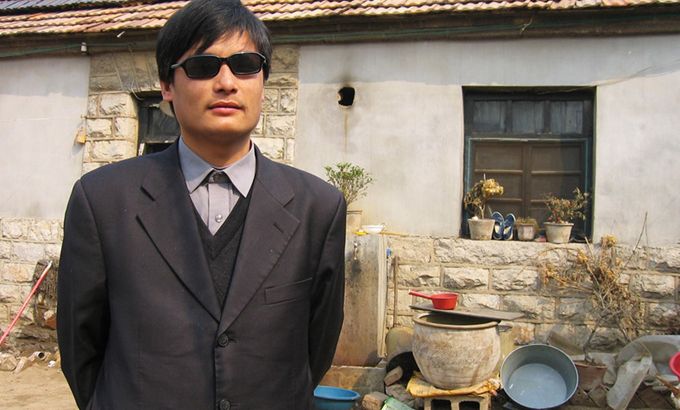US says China to allow activist to leave
Chen Guangcheng offered fellowship by US university and will be accompanied by his family, state department says.

China has agreed to let Chen Guangcheng, the blind Chinese dissident at the centre of a diplomatic crisis, and his family leave the country soon, according to the US state department.
Victoria Nuland, the department’s spokesperson, said in a statement on Friday that China would expedite travel documents for the rights campaigner, who escaped house arrest and fled to the US embassy, where he spent six days before emerging on Wednesday.
“Mr Chen has been offered a fellowship from an American university, where he can be accompanied by his wife and two children,” she said.
“The Chinese government has indicated that it will accept Mr Chen’s applications for appropriate travel documents.
“The United States government expects that the Chinese government will expeditiously process his applications for these documents, and make accommodations for his current medical condition.”
Nuland said negotiations over Chen’s future were “handled in the spirit of a co-operative US-China partnership”.
Chinese concession
Earlier on Friday, China announced that Chen could apply to study abroad like “any other Chinese citizen”.
“If he wants to study abroad, he can apply through normal channels to the relevant departments in accordance with the law, just like any other Chinese citizen,” Liu Weimin, foreign ministry spokesman, said in a brief statement.
However, Chen remains in a guarded Beijing hospital ward, unable to see US officials. “I can only tell you one thing. My situation right now is very dangerous,” Chen was quoted by Associated Press news agency as saying.
| Chen tells Al Jazeera safety deal was not honoured |
“For two days, American officials who have wanted to come and see me have not been allowed in.”
The Chinese foreign ministry’s announcement followed a public appeal by Chen, who spoke by phone to a US congressional hearing on his case, asking to be allowed to spend some time in the US.
“I want to come to the US to rest. I have not had a rest in 10 years,” Chen said, his comments made on a mobile telephone that was held up to a microphone at Thursday’s hearing.
“I’m concerned most right now with the safety of my mother and brothers. I really want to know what’s going on with them.”
News agencies citing the Daily Beast website said Chen wanted to leave China on the aircraft of Hillary Clinton, the US secretary of state, who is in Beijing for talks with Chinese leaders.
“My fervent hope is that it would be possible for me and my family to leave for the US on Hillary Clinton’s plane,” Chen said.
The crisis erupted last week when Chen sought refuge in the US embassy.
He stayed there for six days until Wednesday, when US officials took him to a Beijing hospital after assurances from the Chinese government that he and his family would receive better treatment.
Broken foot
Chen, who has been receiving treatment for a broken foot sustained during his escape, said US officials had left him alone there with his family, although he said he expected them to stay with him.
“Gary Locke, Campbell and the others took me to the hospital, but they have all left,” he said, referring to Locke, US ambassador, and Kurt Campbell, a senior US diplomat.
Chinese media have accused the US of using Chen to demonise China.
“The fact that the US brought up the issue of Chen Guangcheng does not mean that the US really has any good will, but that it is full of desires to put on a show,” the Beijing Times said.
| Fellow exile discusses Chen’s case with Al Jazeera |
Earlier, Chen told Al Jazeera that he feared for his safety: “The agreement between the US and China guaranteeing my safety has not been fully honoured.”
Chen described the situation in his house as “very bad”, saying authorities have installed seven cameras and that there are police in his home.
“There are lots of people there. They eat at my dining table, use my furniture. The situation isn’t good. They also want to install an electric fence,” Chen said of his home in Dongshigu Village in Shandong province.
He got in trouble with the Chinese authorities after his criticism of planning officials whom he accused of forcing thousands of women to have abortions or be sterilised as part of China’s one-child policy.
Meanwhile, during talks in Beijing, Clinton pressed China on human rights but avoided mention of Chen, focusing on North Korea and Iran.
For her part, Clinton assured Hu Jintao, China’s president, that relations between the two countries were the strongest they had ever been.